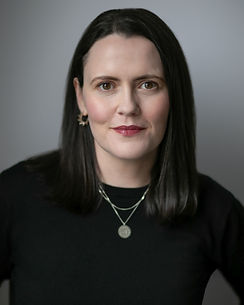
Other Words

Caroline Magennis
Caroline is a writer and Associate Professor in Contemporary Literature, and has written the book Harpy: A Manifesto for Childfree Women. Based in the UK, she identifies as childfree - or as a Harpy.
Questions
1. Please tell us a bit about yourself and your work.
I am Associate Professor (Reader) in Contemporary Literature at the University of Salford, where I am Impact Lead for the School of Arts and Media and teach as much Irish writing as they will let me get away with. I am the author of Northern Irish Writing After The Troubles (2021), which was the joint winner of the BACLS Prize, and Harpy: A Manifesto for Childfree Women, which was published in May 2024 by Icon Books (English) and Grupo Planeta (Spanish).
Originally from Portadown, County Armagh, I have published widely on literature and culture from the North of Ireland with a focus on women's writing, contemporary fiction and popular culture. I live in Manchester with my partner, Ed, and outside of work and writing, I enjoy strength training, going out dancing and a coffee so strong it nearly takes your eyebrows off.
2. Has writing always been a focus for you or was it a Plan B?
I have written academically in some capacity for twenty years, and written bits and bobs my whole life. I write in a journal, I keep notebooks everywhere, writing is just part of who I am even if no-one ever reads it. I’ve never put any pressure on my creative output as my academic publications are a part of my job which pays my bills, but have enjoyed letting other kinds of writing breathe these last few years. I don’t know that anything I write is ever planned – I just love reading and daydreaming and seeing where a page or a day will take me.
3. How do you explore ideas or find inspiration for your work?
I read, I listen, I watch, I stay alive to the world and open to new ideas. I don’t rule myself out of anything and try to talk to as many people as possible. I work out what I think through writing, I let things rise in me and try not to be afraid of what’s challenging. I just keep going – I don’t try to find
inspiration, but I listen when it knocks.
4. What does the process of writing involve for you?
Getting it done. I am not a perfectionist – I write swathes of things I don’t use, I don’t agonise over first drafts and I keep going no matter what. The hard bit is usually before the really good bit. Some talk about a writing habit as involving some kind of punishing discipline but that’s not me – like most, I fit in writing around my job and life, so can’t be precious about my environment. I can write a few words between seminars, on the train or a Sunday afternoon. The trick is not to leave your words too long so you always have ideas ticking over.
5. And what does writing then also give you in return?
Freedom and space to not know what the endings will be. Possibility. Glimpses of hope. Excitement. Frustration. Relief. But these are all by-products of sitting down and being consistent. When you do that, you never know where it’s going to take you!
6. Has seeing your work in print changed how you view yourself, and also how you view your NoMo status?
I never really thought of myself as a spokesperson for being childfree, and I still don’t! I was in my 40s when the book came out, and fully settled in my life and career, so there wasn’t a lot that I’d like to change in myself. The main thing has been people telling me their stories, including people I thought I knew well! I feel so privileged to get a window into people’s lives and I hope the book helps them. It has meant a great deal.
7. Tell us about the wider reception that you’ve had to sharing your story - has it changed how others have viewed you and your identity as a non-parent?
I’ve had such a lovely, positive response to sharing my story – I’ve been so overwhelmed by the interest from parents and carers. There are so many thoughtful, open-minded people out there who pay no mind to the divisive rhetoric in some corners of the press! I don’t know if others view me
differently but some have said I’ve made them think differently about their friends and family, let’s hope that’s a positive!
8. How do you feel about the current representation of childless and/or childfree people in literature?
It’s mixed, some of it is positive and some of it still plays into outdated stereotypes. I ignore what’s not for me and focus on books and films that I enjoy – the non-parent characters don’t have to be saints, and we all love a good villain, but I want complex, embodied representations of our lives. I have two chapters in the book about this!
9. What would you like the publishing world to know about non-parents, both as writers and readers, and our stories?
That there is such an appetite for our stories out there – my book has been featured in Vogue, Marie Claire and Stylist, and in multiple newspapers and podcasts. There’s a lot of us out there and we support non-parent creators!
10. What future plans do you have, especially for your writing?
Oh now, that would be telling! Watch this space.